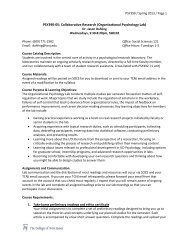MACHIAVellIAnIsM, UnetHICAl BeHAVIoR, AnD Well-BeIng In ...
MACHIAVellIAnIsM, UnetHICAl BeHAVIoR, AnD Well-BeIng In ...
MACHIAVellIAnIsM, UnetHICAl BeHAVIoR, AnD Well-BeIng In ...
Create successful ePaper yourself
Turn your PDF publications into a flip-book with our unique Google optimized e-Paper software.
186 DAHLING, KUyUMCU, AND LIBRIzzI<br />
test), as well as passive cheating (e.g., remaining silent when a bill is miscalculated in their favor;<br />
Bloodgood, Turnley, and Mudrack, 2010). Bloodgood, Turnley, and Mudrack (2010) also examined<br />
the effect that an ethics course would have on attitudes toward these types of cheating and found<br />
that the attitudes of highly Machiavellian participants toward passive cheating were unchanged<br />
after receiving the ethics training. The implications of this finding are that Machiavellians may<br />
indeed be immune to such ethics instruction.<br />
Bass, Barnett, and Brown (1999) identified several relationships between Machiavellianism and<br />
ethical orientations that explain why Machiavellians tend to employ these unethical tactics. For<br />
example, they found associations between Machiavellianism and relativism, which they defined<br />
as the degree to which one accepts or disregards universal moral principles when making decisions<br />
(Forsyth, 1980). They also suggested that Machiavellianism is inversely related to idealism,<br />
which refers to a tendency to seek balanced and favorable outcomes for all parties (Forsyth, 1980).<br />
Bass, Barnett, and Brown (1999) also confirmed that Machiavellians are less inclined to support<br />
social rules and follow authority.<br />
Given all of these findings concerning theft, lying, sabotage, and cheating, it is not surprising<br />
that Machiavellianism is one of the strongest trait predictors of unethical behavior in many<br />
contexts (Jones and Kavanagh, 1996). Unfortunately, these Machiavellian behaviors can pose a<br />
considerable risk to the well-being of organizational members in many respects.<br />
eFFeCts oF MACHIAVellIAn <strong>BeHAVIoR</strong> on <strong>Well</strong>-<strong>Be<strong>In</strong>g</strong><br />
We have given evidence that Machiavellian behaviors are characteristically unethical and manipulative;<br />
here, we suggest that the nature of these behaviors is an important determinant of wellbeing<br />
in the workplace. Consistent with Giacalone and Promislo (2010), we define well-being in<br />
terms of both subjective elements (e.g., satisfaction and psychological appraisals of life events)<br />
and objective elements (e.g., physiological wellness, stress, and illness). From this perspective,<br />
well-being involves being satisfied with one’s work and nonwork circumstances, experiencing<br />
positive emotional states, and being healthy in the sense of freedom from psychological and<br />
physiological illnesses.<br />
Given that the unethical acts committed by Machiavellians can include a wide range of behaviors<br />
(e.g., stealing, lying, and cheating), it seems logical that Machiavellianism has a multidimensional<br />
effect on well-being, affecting not only the targets or victims of the behaviors but also work teams<br />
and the organization in a much more general sense (ibid.). <strong>In</strong>terestingly, because Machiavellianism<br />
is a personality construct, the perpetrator (i.e., the Machiavellian) should also experience significant<br />
detrimental effects on his/her own well-being resulting from this innate, amoral orientation and<br />
the actual execution of unethical acts.<br />
Unethical Behavior and the <strong>Well</strong>-Being of Machiavellian employees<br />
Although the effects of Machiavellian behaviors on others are well-established, less research has<br />
considered how the well-being of Machiavellians is impacted by their own unethical behavior.<br />
Moreover, much of the existing research on this topic shows inconsistent results, which may reflect<br />
differences in job type, organizational setting, or the level of career success among Machiavellian<br />
individuals (Jones and Paulhus, 2009). Nevertheless, some emergent trends in the literature<br />
suggest that Machiavellian employees may suffer more than they benefit from their orientation<br />
toward others with respect to lower satisfaction, higher anxiety, and compromised psychological<br />
well-being.








